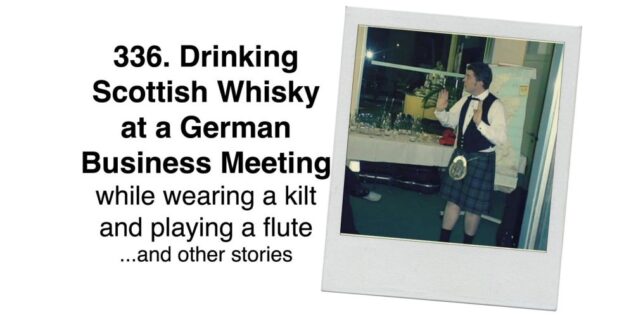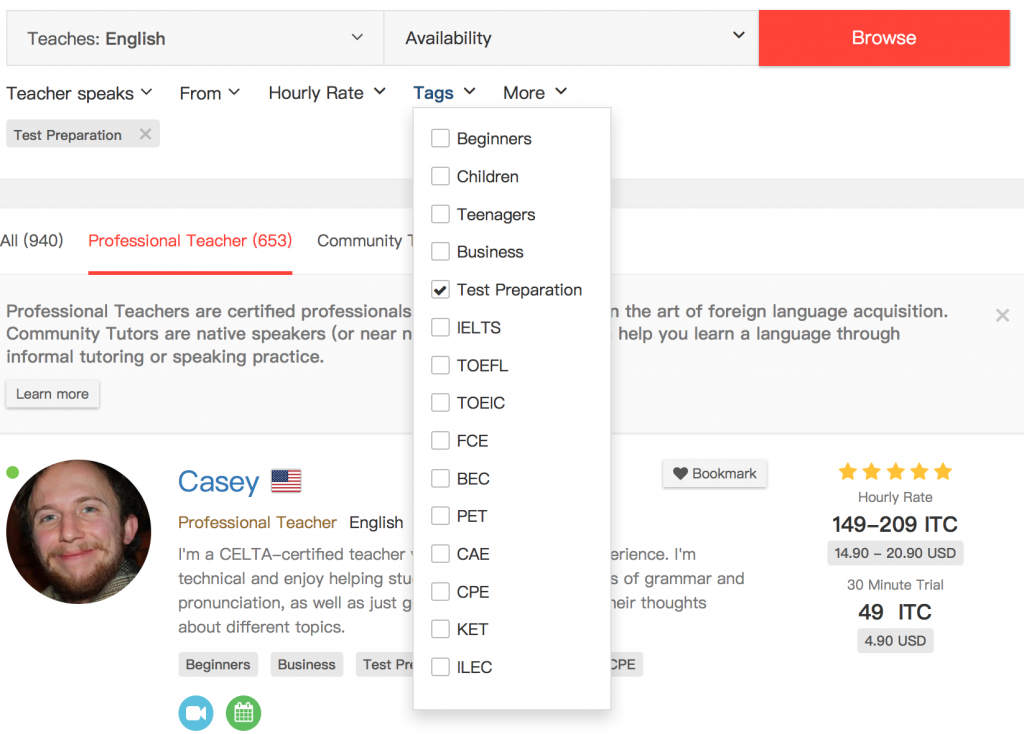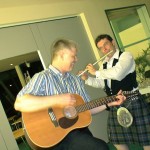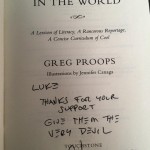This episode features an interview with English teacher and podcaster Craig Wealand from InglesPodcast.com Craig is originally from Essex in England, but now lives in Valencia in Spain where he works as an English teacher and Cambridge examiner for the British Council. Craig has been an English teacher for over 20 years, and for the last few years he has also been producing episodes of his learning English podcast, which won the award for Best Educational Podcast in the UK Podcaster awards last year. In the episode we find out about Craig, talk about his career, his teaching experiences, his podcasting and also I ask him some random “quick fire” questions, just like he does with guests on his podcast.
 [DOWNLOAD]
[DOWNLOAD]
Preamble (some stuff about swearing and vocabulary before the interview begins)
Before we get to the interview, I’m going to do a preamble where I mention a few things about swearing and vocabulary. This might take about 10-15 minutes. The interview is coming! A preamble is a ‘preliminary statement’ or ‘information that comes before the main content’ – before the main, “meat” of the episode. It’s a starter, essentially. This is a 3 course meal, this episode. You’ll get preamble, which is the starter. Then the main course, which is the interview, and then a desert, which is just some more info and announcements at the end. So, here’s the preamble. You don’t mind a preamble do you? Do you? No? Not really? Maybe a little bit? What’s that? Oh, “get on with it Luke?” oh, ok.
 A Note on Swearing in the Podcast
A Note on Swearing in the Podcast
You should know that there is a little bit of swearing in this episode (just a couple of s- words in the middle of the interview). I know most of you don’t mind swearing but I thought I’d let you know just in case you’re particularly bothered by it.
I just want to mention these points about swearing though, just to be clear about it:
- Swearing is pretty common in English language culture – but it’s still very rude if you use swear words in the wrong situations.
- Usually, we just swear when we are with close friends, or in certain informal situations like at a football game, in a comedy club, or when we’re particularly angry – like when you’re driving and another driver does something dangerous on the road, or when you hit your thumb with a hammer, or something like that.
- For you as a learner of English I’d say – just be aware of the impact of swearing in some situations and remember that, of course, you shouldn’t do it in business meetings (usually) or in classrooms, or with your host family or something. In fact, swearing is quite a subtle and complex art and if you do it wrong and in the wrong moment it can make you look really bad. I’d say – if in doubt, don’t swear.
- However, I want this podcast to be an authentic reflection of natural English and so I include some swearing some times. My aim is not to offend anyone.
- Personally, I’m not bothered by swearing. I am rarely offended by it, and in fact in the right circumstances I find it quite enjoyable.
- But I know you might be listening with kids in the car or something, or you might not like these words, so when swearing happens in an episode I’ll just try to give you fair warning in advance.
- For a while I used to bleep out swear words when they happened in interviews. You might have heard a “BEEP” instead of a swear word. Actually, I got a few messages saying “Why are you beeping out the swear words? I want to hear them? I want to be able to hear every word, especially the swear words!” So – in fact a lot of you really want to hear the swear words. Click here to listen to episode 83. “How to swear in British English”
- I know what most of you are thinking. You’re thinking – “It’s fine Luke. There’s no need to justify it. We don’t mind. No worries. Now, get on with the podcast! Bring it on!” OK then. Yes, I don’t need to go on about it so let’s carry on. And that brings us back to…
Craig Wealand and his podcast – http://InglesPodcast.com
Craig produces and records episodes of InglesPodcast himself and there are 3 types of episode on the show. There’s “Learn English with Reza and Craig” in which he’s joined by his friend Reza, and there’s “Pass FCE” which is all about the Cambridge FCE exam and then there’s “Mansion Interviews” in which Craig interviews various interesting people that he has discovered in one way or another. Last year Craig contacted me for an interview on his podcast, and I was very happy to be considered interesting enough to be invited on to the show. You can listen to that episode of InglesPodcast, with me, by clicking the link below.

[DOWNLOAD]
By the way, you ought to know that Craig’s website and podcast are both created specifically for speakers of Spanish, who are learning English. So, if you’re a Spanish speaker you should be particularly interested in Craig Wealand’s work and I suggest that you check it out. But it’s not just for Spanish speakers – the majority of the content on the podcast is for anyone learning English. Some Spanish words crop up every now and then.
Craig and I have a few things in common as we are both English teachers who do podcasts and who live in foreign countries, so it was really nice to chat to him and I hope you enjoy listening to this episode as much as we enjoyed recording it.
Just a reminder: Check out http://MansionIngles.com and http://InglesPodcast.com for Craig’s work and his podcast.
Vocabulary
Now, during this conversation various nice chunks of vocabulary came up, and I’d like you to listen out for them. These are just bits of vocabulary that I think you should notice – natural expressions that you could add to your vocabulary. I have listened to the interview again and prepared a list of those expressions and I’ve printed them on the page for this episode – so you can go there, take the expressions, put them in your vocab list or flashcards app or whatever. I’m also going to read them out to you now. As a listening exercise you can then try and notice these expressions as they appear naturally in the conversation. That’s right – you can play a game of vocab hunter! (or just have a cup of tea and a biscuit if you prefer)
Here are the phrases you should try to identify. There are about 35 of them. I’m going to read them out but it’ll be super-duper quick. The main thing is I just want you to be mindful and notice these phrases. I’m not going to explain them all now, I’m just reading them out for you quickly. But, in the next episode of this podcast, which I’ll upload soon, I’m going to go through all these phrases properly, explaining and clarifying them. That should help you to really learn them.
So now, let me quickly just list these expressions like a robot – these are expressions to look out for in the episode. They will be fully explained and clarified in the next episode. OK, here we go…
- I thought it was about time that I got you (back) on LEP (it’s about time I did something)
- It’s been getting on for 3 years. (to be getting on for xxx years)
- How did you end up being an English teacher? (to end up doing something)
- He ended up marrying an Israeli girl.
- I took part of the credit for that. (to take the credit for something)
- I didn’t see myself doing a clerical job. (to see yourself doing something)
- You couldn’t just give away money willy nilly. (to do something willy nilly)
- You must have brushed shoulders, as it were, with Essex’s finest. (to brush shoulder’s with someone) (Essex’s finest)
- As soon as I got over the fear of standing in front of people… (to get over something)
- I came back to Spain with my tail between my legs. (with your tail between your legs)
- You start looking at things in a different light. (to look at something/see something in a different light)
- The grass is always greener on the other side.
- I lived in an English cocoon for the first year. (a cocoon)
- As drivers, they’re very erratic and dangerous! (erratic)
- It was just a scrape – a small dent in the car. (a scrape, a dent)
- Lots of tailgating goes on when you’re driving. (tailgating)
- Customer service sometimes falls a bit short. (to fall short)
- I’m always on a mission to go to the pub. (to be on a mission to do something)
- I want to sit in a pub, nursing a pint of Guinness. (to nurse something)
- To be constipated.
- My French is coming along. (to be coming along)
- It’s a question of trying to squeeze (in) bits of learning into the lifestyle. (to squeeze something in)
- It doesn’t just magically rub off on you. (to rub off on someone)
- They had to use the language in order to get by in a work environment. (to get by)
- If I don’t pull out the stops and work on the language then it’s not going to improve. (to pull out the stops)
- I’m turning the tables on you now Craig! You’re going to be in the hot-seat this time. (to turn the tables on someone / the hot seat)
- I guard my work desk with my life. (to guard something with your life)
- If she dares to put a pen on my desk I shout at her and we have an argument. (to dare to do something)
- You’d keep them in a bag and every now and then you’d take a look and have a whiff of the petrol. (to have a whiff of something)
- They (cats) look down their nose at you. (to look down your nose at something)
- I’ve never been very keen on cats. (to be keen on something)
- I can’t talk you round. (to talk someone round)
- The thing about dogs is that they’re too needy, too high-maintenance. (needy / high-maintenance)
- Doesn’t that bother you, that they’re so fickle? (fickle)
Ok, so there are some phrases that you’re going to hear. Visit the page for this episode to read those expressions – you could google them or look them up in a dictionary, or just wait for the next episode when I will clarify them properly. The interview is about to start. See if you can spot the phrases I just mentioned, or alternatively, just kick back, relax and enjoy this mellow conversation with Craig Wealand.
*Interview Begins*
So, that was my chat with Craig Wealand
Hope you enjoyed it! Head over to his website to check out the podcast, especially if you’re a Spanish speaker and I know there are a lot of you listening to this – but promise me one thing – don’t forget me ok?
Remember all the vocab and expressions I listed earlier in the episode? That’s all going to be explained and clarified in the next episode, unless I get abducted by aliens and I can’t upload it.
So, we’ve had the starter – the preamble, we’ve had the main course – the interview, now here’s the dessert. Let’s say it’s a cake made from announcements.
Some more announcements
Here are just some other announcements and bits of news for you.
I’ll be on Blab, speaking to Craig + guests tomorrow (Thurs 10 March) at 5pm CET
If you enjoyed the conversation in this episode and you’d like to hear more than you might like to check out our blab conversation. We’re going to talk about comedy, and you can join us if you want. Just click this link to check it out https://blab.im/craig-wealand-comedy-with-luke-thompson
That’s really a message for those of you who listen to this as soon as it is published because I expect many of you will have missed the conversation now but never mind – I think you should have a look at Blab anyway, it’s a cool platform which is an interesting way to just listen to people talking online, or do some speaking if you’re feeling up for it.
You might be thinking – What’s Blab, Luke? OK, I’ll tell you.
Blab is an app and a website that allows you to have video conversations online. It’s a bit like Periscope, but 4 people can talk not just one, and everyone else can watch the conversation and add comments and questions. You can get Blab as an app on your phone or just through your web browser on your computer. If you’d like to join us, just click this link https://blab.im/craig-wealand-comedy-with-luke-thompson (or find the conversation by searching my Twitter feed – I’m @englishpodcast )
To take part you’ll have to sign up with Blab (it’s free and easy to use). Then you can watch the conversation (you’ll see 4 video screens with the 4 people talking to each other), leave comments or questions, or if there is an open spot you can join the conversation yourself, and be one of the 4 people on video in the discussion. It’s fun, it’s free and it’s a chance to just listen to English, ask questions or even do some speaking practice if you feel up for it. Our blab conversation is going to start at 5pm tomorrow (Thurs 10 March). Here’s the link again https://blab.im/craig-wealand-comedy-with-luke-thompson
If you’re too late and you missed that, have a look at Blab anyway. It’s pretty interesting, and I might be doing more things on Blab in the future.
So that’s blab.
 italki
italki
Here’s a quick reminder about italki, the sponsor for this podcast. Go to teacherluke.co.uk/talk to check out italki where you can find native English speakers and qualified teachers for conversation or tailored lessons just for you. It’s one of the best ways to improve your spoken fluency and is also cheaper and more convenient than taking language lessons offline. This interview with Craig was done on Skype just like lessons on italki and it’s easy easy easy. Also, because you’re a listener to this podcast italki will give you a voucher worth 100ITC (about 10 dollars) which you can use on subsequent purchases of lessons and stuff. That’s not too shabby! https://teacherluke.co.uk/talk to start talking now! Oh, and if you’re shy – don’t be – the native speakers there are very friendly and it’s a totally cool and relaxed atmosphere in which you can just take your time and start speaking. Don’t be shy, give it a try.
Alright, that’s almost it for this episode, but I would still like to ramble on a bit more about some other podcast-related news and admin.
New comment system
As ever I invite you to leave your comments on the page for this episode.
You might have noticed that I have a new comment system on the website now. I’m now using the Disqus system. That’s basically an in-built comment system on my website. If you’ve seen it, let me know how it’s working for you. It should be smoother and more user-friendly than the previous comment system. For me, the improvements are these things:
You can now easily upload pictures into your comments. So that means you can share images, your own photos, memes etc.
If you include a link in your comment it should appear and will automatically be clickable (the old comment system used to do weird things with links sometimes – make them disappear etc). Some video content will automatically embed, which means that a link to a youtube link will automatically become an embedded youtube video in your comment.
Disqus is used on lots and lots of websites, so if you sign into Disqus you can then comment on lots of other websites using the same profile, and you can keep track of all the comments you’ve made on my website and any other website using Disqus.
Comments can now be deleted or edited by you, so if you’ve made an error or something, you can correct it later.
If you sign up to Disqus you can also get email notifications when other people reply to your comments. So it should now be easier to keep track of the conversations between you and other LEPsters on different pages of my website.
When you leave a comment with the new system, it won’t reload the whole page when you submit your comment. That used to happen with the old system, which was a bit annoying if you wanted to comment and listen at the same time. Now you can listen and comment and it won’t interrupt the episode by reloading the page. Nice.
Show us yer face! The Disqus system lets you show your own photo next to your comments. If you sign in with Twitter or Facebook it’ll show your Twitter or Facebook pic, or you can just upload another photo to your Disqus profile. If you just log in as a guest when you leave a comment (that means you just give a name and an email address but not a full Disqus user) you will appear as an LEP Ninja, with a little photo of an LEP Ninja – as you jump out of the shadows, leave your comment and then disappear into the night. ;)
All the old comments are still there and can still be read. At this moment in time, the website has had about 10,000 comments in total across all the pages on the site. They’re all still there.
The Disqus system should help to build more of a community feeling on teacherluke.co.uk
For full details about comment notifications (and how to control comment notifications from the old WordPress system), just click here: How to control comment notifications from WordPress and Disqus.
It’s good to see that so many of you have written about your commitments to learning English after listening to episode 332 with Olly Richards. It’s also nice to see that Olly himself is getting involved and writing some messages of encouragement there for you in the comment section for episode 332.
Also, I’m glad that lots of you enjoyed the misheard lyrics in the last episode. That was just a bit of a laugh wasn’t it? One thing I’d like to correct is that Meg and Jack from the White Stripes aren’t brother and sister. In fact, they were married to each other for many years. So, I just wanted to clarify that. For some reason I always thought they were siblings, but no – they were an item. That’s a bit weird. Maybe that explains why Jack was so upset about what happened with me at band practice, and why he chucked me out of the band. If you have absolutely no idea what I’m talking about, go back to episode 333 and listen to the whole thing!
Another nice thing I wanted to add here in this post-interview bonus section is that so many people have voted for their favourite pics in the LEP Photo Competition. Voting is now closed for that, so if you forgot to vote, that’s just your hard cheese! I’ll let you know about the winning pictures in due course.
That’s it – remember that the next episode should be about that list of vocab and expressions from the interview with Craig. I’ll explain and clarify them, which should help you both understand and pick up some more vocabulary, in this long and enjoyable journey into the acquisition of natural English. So, next stop – vocabulary in episode 335. (unless for some reason I can’t upload episode 335, like because I get abducted by aliens, or something less exciting, like I have to much work to do).
 Thanks for listening all the way to the end of another long episode of LEP – you are a truly wonderful, attentive and patient human being and good things are bound to come your way sooner or later if there’s any justice in this world. Bye!
Thanks for listening all the way to the end of another long episode of LEP – you are a truly wonderful, attentive and patient human being and good things are bound to come your way sooner or later if there’s any justice in this world. Bye!

![]()





 italki
italki








 A Note on Swearing in the Podcast
A Note on Swearing in the Podcast





